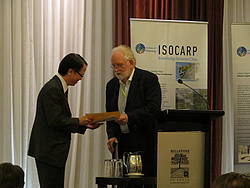
Jury Member Terry Byrnes congratulating Stanley Yip
Winner of the GERD ALBERS AWARD 2013:
Stanley C. T. YIP. 2011. Low Carbon Ecological Space:? Rethinking the Cross-Dimensional Approach to Urban Planning. Dalian, China: Dalian University of Science and Technology Press.
Everybody is grapling with climate change issues and this book addresses a number of aspects. It brings forward its message in a comprehensive way (theory, illustrated with case studies the author himself was involved directly). It has a clear and ordered structure and explains the adaptation of current environmental concepts to justify the author’s arguments. In pursuit of a sustainable model for contemporary patterns of urbanisation, a more scientific approach is championed though the author’s own work. As a practical guide to the translation of those environmental concepts into a foundation for conceptual planning, the author has helped to provide a more codified rationale for planning. The six planning concepts are timely in the face of unprecedented environmental challenges and serve as a model to apply to our urban future.
Other Entries included:
Caroline Bos. 2012. Hello Stranger – Phenomenology and Topology of the Megacity. AD-Architectural Design, 82(5): 136-141. A provocative essay on why the megacity must be understood first and foremost through the way in which it is experienced. Architectural challenges and potentials are then located.
Caroline Bos. 2012. Self-Organization. Stichting Archis, 146-149. An insightful exploration of professionalism and self-organization in the architectural community. The basic argument is that these two attributes should not be antagonistic, but complementary.
Morched Chabbi. 2012. L’urbain en Tunisie, Processus et Projets. Tunis: Edition NIRVANA. A well-structured, concise, and evidence based collection of articles on urban development in Tunis and other cities in Tunisia. Of direct value to planners but also to a wider constituency which has to grapple with similar issues of urban expansion and institutional deficiencies.
Cees Donkers. 2012. Eindhoven, ‘City as a Lab’ ‘Brain-field’ for a New Generation. In ISOCARP REVIEW 2012, p. 186-213. Unashamedly written almost as a blog, and very visual, showing how exchange of urban ideas has adapted to the electronic media, for the younger generation in particular.
Helena Freino. 2012. Rekonstrukcja Miasta. Co to Oznacza? (Reconstruction of City. What Does it Mean?. Space and Form 17. Polish Academy of Science/Gdansk Department, Faculty of Civil Engineering and Architecture, West Pomeranian University of Technology in Szczecin. A precise and insightful reconstruction of the process of mutual learning and success in Barcelona and Bilbao.
Hueng Wing, John Kwong, 2012. MARINAS. Dalian, China: Dalian University of Technology Press Co, LTD. A well-structured and practice-oriented “cooking book” for planning marinas. The book is well designed and contains an accessible graphic language that enables accessibility for planning practitioners.
Jury Members:
David Prosperi, USA (Chair)
Terry Byrnes, Australia
Madina Junussova, Khazakhstan
Judith Ryser, United Kingdom
Andreas Schneider, Switzerland